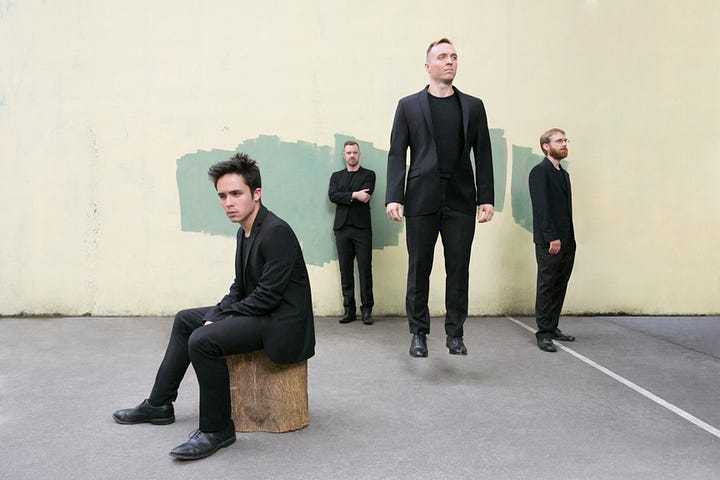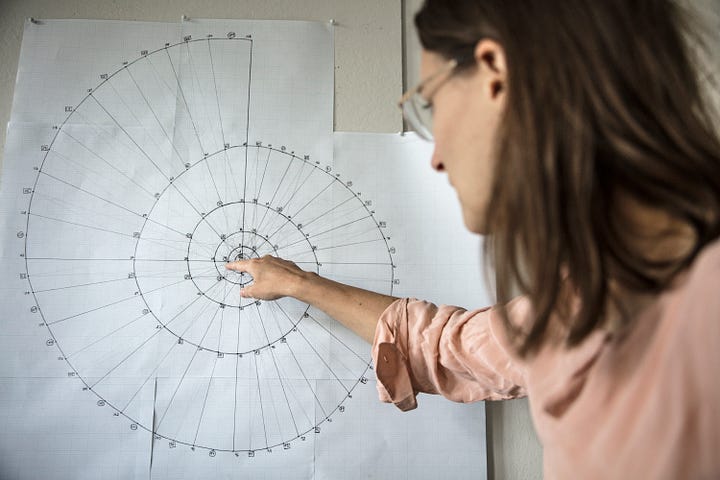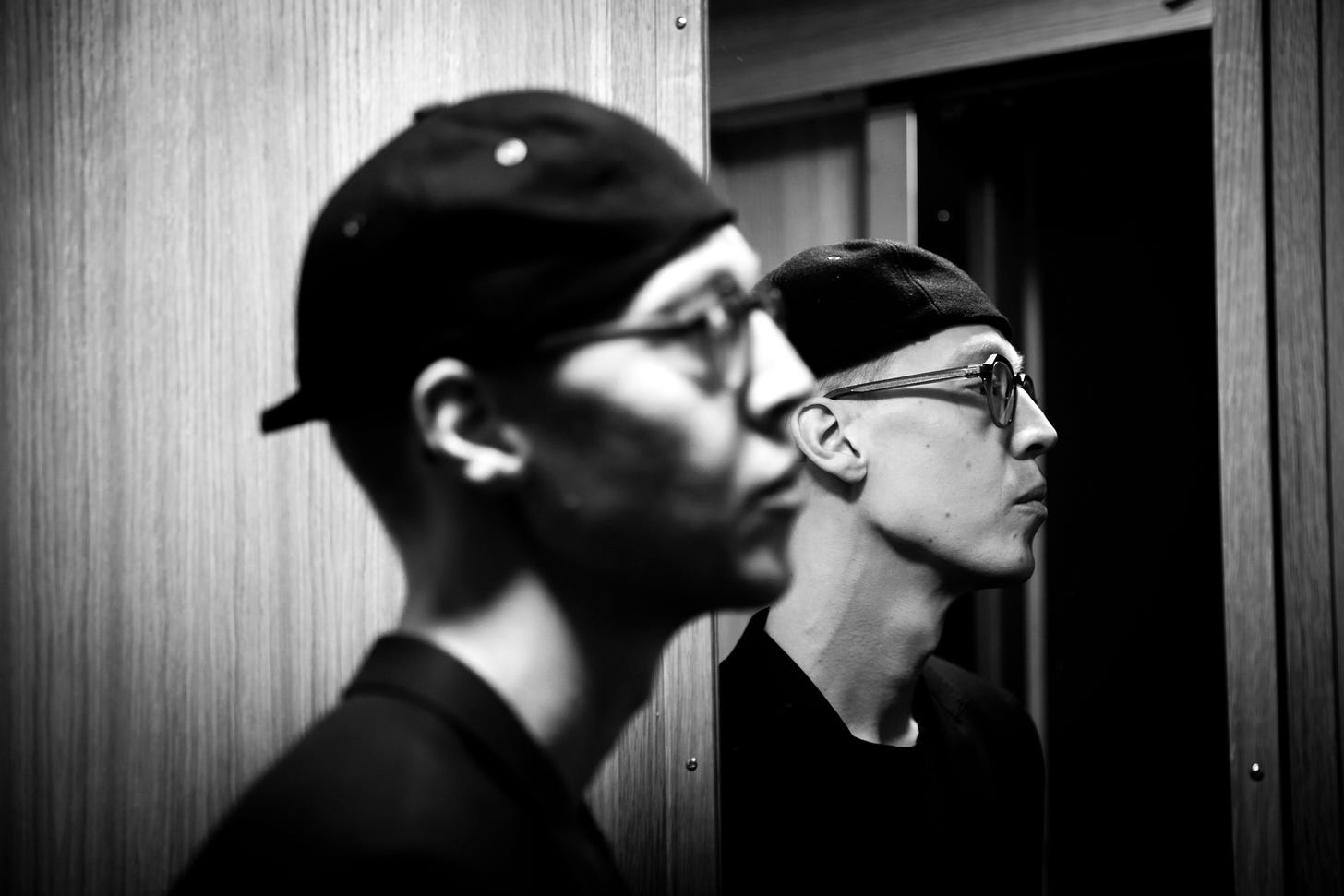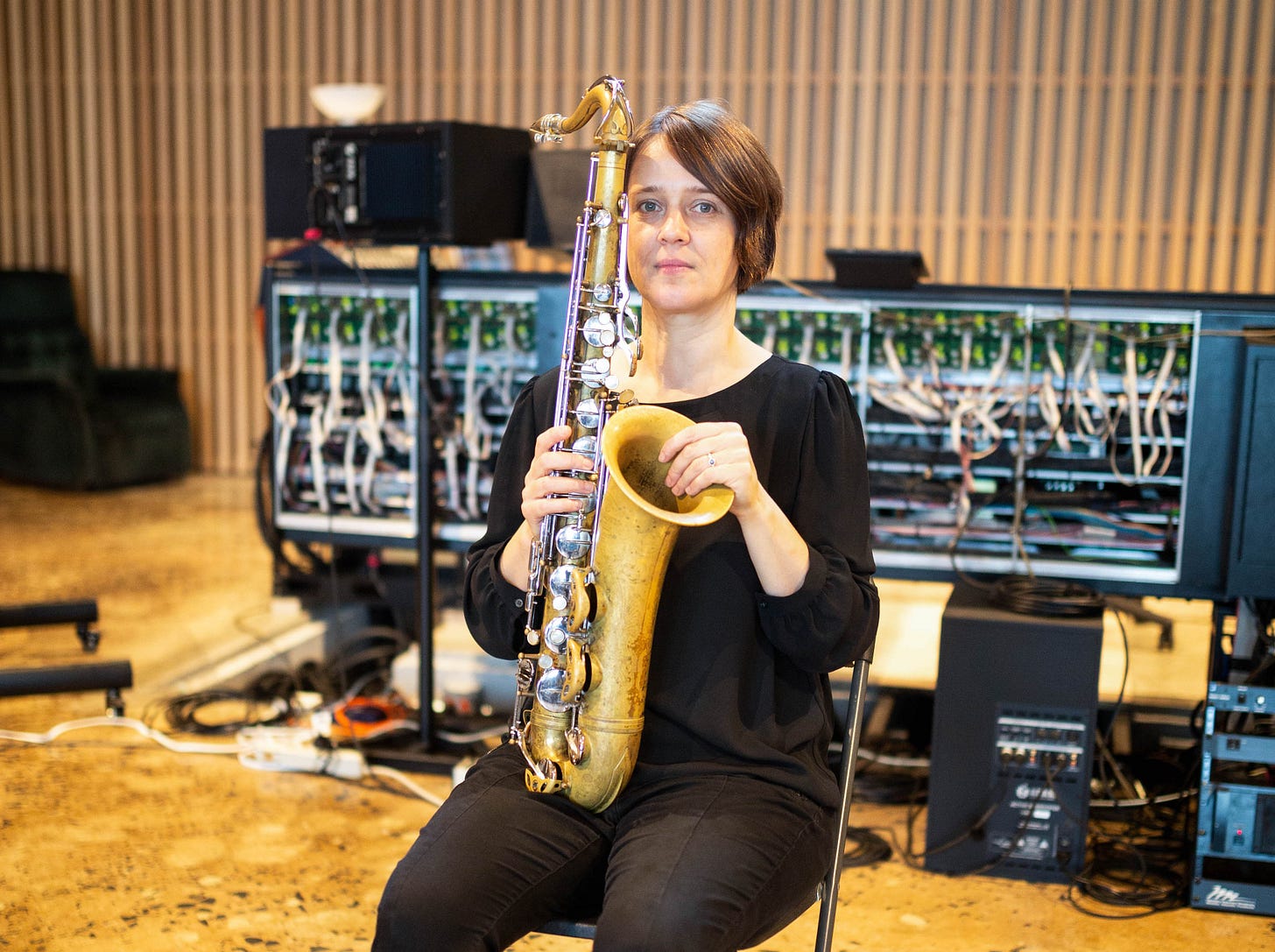

Catherine Lamb in the most ideal of circumstances
Last week I mentioned that I was able to finally hear the masterful JACK Quartet perform Catherine Lamb’s divisio spiralis live while I was attending Big Ears in Knoxville, Tennessee. I adore and admire the recording featured on the Kairos CD that dropped at the tail end of 2021, but I knew that hearing it in person, where the sound could truly blossom in a physical space, would be infinitely more rewarding. Despite the steady shower of listeners coughing and group exoduses from creaky pews throughout the uninterrupted work, the experience delivered. But I knew that I would hear it again this month, so I held back from saying much before. Last night JACK provided another incredible, precise performance, without the extraneous noise and seriously bolstered by the superb acoustics of the Pierre Boulez Saal.
The titular spiral refers to the shape the composer envisions to map out her sound world, and I’ve over time I’ve adapted the spiral shape for my own listening experience. For nearly 100 transportive minutes skeins of tight, unusual intervals—the piece was written in just intonation—cascaded in constantly new blooms of sound. The harmonies seeped out and sang in a downward drag, each descent sparkling like a sonic diamond. As the piece leisurely but rigorously explores thirteen different sections, each sonic unfolding accrues wisps of tension that crackle through the electric harmonies and melodic fragments. But as the work starts winding down those fragments suddenly build into a serenely beautiful melody, tender yet stark, that concludes the performance with a deeply moving, yet ambivalent splendor.
The sound was astonishing, and I marveled at JACK’s uncanny skill at holding pitches through a harrowing, demanding score, especially one so long. I’ve heard several jazz performances at Pierre Boulez Saal, the gentlest of which worked best in the space, but this was my first time hearing a chamber ensemble and it was extraordinary. The potential of the performer/composer/venue marriage was abundantly clear, but it provided one of the more profound, and transformative listening experiences I’ve had in years.
A taste of Stockholm—new music from drummer and composer Konrad Agnas
I traveled to Stockholm in March for the Edition Festival of Other Music—one of the best fests I’ve attended in a long while—but I’ve been riveted by city’s local scene for a couple of years now, and those feelings only seems to get stronger. Sadly, a dearth of reliable venues and a seeming reluctance of many musicians to tour outside of Scandinavia has kept it something of a secret. The closing performance at Edition was by Swedish native Ellen Arkbro, playing a new work featuring a clutch of musicians from Berlin’s Harmonic Space Orchestra and several from Stockholm’s loaded creative musical community, including keyboardist Johan Graden—the composer’s collaborator on last year’s superb Thrill Jockey album I get along without you very well—and drummer Konrad Agnas. Like so many of Stockholm’s exciting new generation, both of those musicians move fluidly between jazz and improvised settings and more experimental contexts.
Around the same time of Edition Festival, Moserobie Records released Rite of Passage, the excellent bandleading debut from Agnas. If that name seems familiar it could because he has three brothers active on the scene—guitarist Kasper, pianist Max, and bassist Mauritz—who all work together as the Agnas Brothers. (To make it even more confusing, they have a cousin named Nils, who also plays drums.) For the new recording, Konrad is joined by Graden, and two superb figures of the older generation, bassist Torbjörn Zetterberg, and reedist Per “Texas” Johansson. Agnas has already logged plenty of time with veteran figures, such as Johansson and fellow reedist Alberto Pinton, keyboardist Johan Lindström, and more recently he’s been playing in Martin Küchen’s Angles. But he carves out his own terrain on Rite of Passage, complementing sturdy post-bop excursions with a wide array of meticulously deployed accents, starting with the stuttery funk gambits on the brief “Intro.”
Agnas has clearly absorbed a lot of disparate ideas and influences, and he relies on his excellent band to shape those concepts. Zetterberg lays down an insistent ostinato on “Månen och Vargen,” as shape-shifting keyboard patterns from Graden intersect with nimble flute lines by Johansson, who finally kicks off his solo about 1:45 into the track. The band eschews the usual rounds of solos within opening and closing statements of the head not only on this track, but across the album. The drummer isn’t stymied by convention. The opening statement of “Don Rhythmicon” reminds me of a bunch of Scandinavian post-bop these days, but it soon opens up, revealing the nimble interaction between Agnas and Zetterberg, which prods Johansson to uncork a sublime, deeply swinging alto saxophone solo, as Garden leanly traces the action with left-hand outlines before tearing into a high-energy, solo of his own, with the reedist continuing to push against the fray. Johansson taps into same post-Coltrane profundity on the haunting, explosive “Siwa,” which you can hear below, while guest Vilhelm Bromander adds some tanpura on “Bismillah,” a kind of short freewheeling meditation that sets Johansson free.
There are a number of short tracks like, such as “Untitled 1972,” which function as palate cleansers, although I certainly wouldn’t mind hearing the band extend them into full performances. Cumulatively they reinforce a sharp programmatic thinking in how Agnas sequenced the music. The expansive organ lines of Graden and some of the unison passages on “Half Year Song” touch on 70s fusion, but the execution never gets bogged down in bombast—especially when the musicians step aside to let Zetterberg deliver a solo that’s as profound and lyric as anything I’ve ever heard by him. The drummer keeps an impressively light touch on the track, providing an irresistible dynamism that serves as a bulwark against anything too ponderous or heavy. The recording is lovely, bringing the drummer’s crisp cymbal play to the forefront, gliding effortlessly over chattery snare and tom work. Agnas produced the record with Anton Sundell, and even though it’s miles apart, there’s something about that it suggests a shared sensibility with Berlin-based bassist Petter Eldh, a Swedish native who convincingly braids seemingly incongruous ideas through a seductive rhythmic attack. What’s extra compelling about this whole Stockholm scene is how varied everything seems to be, with most players pursuing multiple threads with equal fluency and passion. Get on it.
Ingrid Laubrock won’t stop
Ingrid Laubrock continues to be on a tear, surfacing in loads of disparate settings and consistently developing into new projects. She recently appeared as a soloist with the Trondheim Jazz Orchestra, preceded by a premiere of a new orchestral work performed by the BBC Scottish Symphony Orchestra during Ilan Volkov’s Tectonics Festival in Glasgow. This weekend at Jazzahead in Bremen she’ll perform with a new ensemble called Lilith, comprised of a clutch of young players, none of whom I’m familiar with apart from accordionist Adam Matlock, a close associate of Anthony Braxton.
Last month she dropped The Last Quiet Place (Pyroclastic), a terrific album by a versatile new sextet that provides a varied landscape for her writing. The group is dominated by strings—cellist Tomeka Reid, double bassist Michael Formanek, violinist Mazz Swift, and electric guitarist Brandon Seabrook—and it’s driven by her steady creative partner and husband, drummer Tom Rainey. The title of the album posits a kind of impossible location on a planet suffused with tumult, as human activity has destroyed Earth’s purity. Technology prevents us from escaping a barrage of information, most of it useless. Obviously, we’re fucked environmentally, a fact Laubrock doesn’t shy away from, but her writing imagines a metal space where we can find some peace and clarity, away from the relentless noise. The sometimes turbulent arrangements mirror that sense of flux and disarray, inviting the listener to find the music’s meditative qualities.
The reedist’s six compositions take full advantage of the ensemble’s flexibility, regularly carving out different sections to play against one another, whether it’s Laubrock playing against richly colored strings or Seabrook’s angular guitar laying down noisy chaos against controlled serenity. On the opening track “Anticipation” a series of orchestral swells and eddies built around a recurring tone row change shape with every chorus, constantly altering the sonic landscape and providing the reedist with a perpetually refreshed setting to blow against. The stateliness and grace bring a chamber-like feel, which is quickly punctured when the group moves into “Grammy Season.” It’s built around a pleasingly agitated groove sculpted by Rainey and Formanek and prodded by Seabrook’s post-James “Blood” Ulmer skree, before he melds with Swift and Reid for a series of effective pizzicato unisons. Laubrock’s writing is rigorous, using carefully built structures to propel the music, and offering plenty of improvisational grist. Below you can check out the shape-shifting “Delusions,” another arranging marvel that moves sound around the sextet with surprise-laden invention and resourcefulness.
Meanwhile, over in Peitz
Next weekend the concert presenter and label Jazzwerkstatt have organized a two-day festival in Peitz, where they also present an annual fest early every fall. The town is a couple of hours from Berlin, and other responsibilities will prevent me from attending despite a strong line-up that includes the duo of Conny and Matthias Bauer, Sylvie Courvoisier’s excellent long-running trio with drummer Kenny Wollesen and bassist Drew Gress, and reedist Peter Ehwald’s Stamp. Among the less known performers is the Berlin-based pianist Céline Voccia, a French native who left behind her studies in contemporary classical music for jazz and improvisation. Earlier this year she dropped Abîme, an impressive trio recording with bassist Jan Roder and drummer Michael Griener, on the Jazzwerkstatt imprint. All seven pieces are fully improvised, but the buoyant, elastic rhythm section imbues the music with an elegant swing-based propulsion no matter how free or exploratory things get.
Voccia certainly didn’t ditch the influence of classical music when she left that world behind. Her playing toggles between abstract grace and harmonically dense splatters of sound, but her aggression and clattering clusters never get too heavy or ponderous, and her connection to the rhythm section really makes everything sizzle and spin. Even when the group builds up a major head of steam, as on the closing moments of “Miroirs Envolés,” the pianist banging away at the keys like Cecil Taylor, there is still something aerated and bouncy about the attack. Below you can check out the album’s lengthy closing track, “Rémanence.”
Recommended concerts in Berlin this week:
The big action this weekend in Berlin is the three-day celebration of Keith Rowe’s music over at KM28 between Thursday and Saturday, April 27-29. The event was organized by Lucio Capece, who will perform with Sean Meehan on the opening day of the event (see below). The three programs are listed below, but on at 5 PM on Saturday I’ll be part of a roundtable discussion with Rowe and Brian Olewnick, author of the definitive biography, Keith Rowe: the Room Extended.
April 27: Keith Rowe Celebration Festival, Day 1 (Kaffe Matthews, Marta Zapparoli & Andrea Parkins, Sean Meehan & Lucio Capece, with Keith Rowe joining selected sets), Reserve a seat (limited capacity), 6:30 PM, KM28, Karl-Marx-Straße 28, 12043 Berlin
April 27: Timo Lassy Trio, 8:30 PM, A-Trane, Bleibtreustraße 1 10625 Berlin
April 28: Keith Rowe Celebration Festival, Day 2 (Lidingö: Burkhard Beins & Andrea Neumann; Catherine Lamb: The Additive Arrow performed by Catherine Lamb & Lucy Railton; Annette Krebs, with Keith Rowe joining selected sets), Reserve a seat (limited capacity), 6:30 PM, KM28, Karl-Marx-Straße 28, 12043 Berlin
April 29: Keith Rowe Celebration Festival, Day 3 (Judith Hamann & James Rushford; Quentin Tolimieri, Ignaz Schick & Valerio Tricoli; Axel Dörner & Bryan Eubanks; Jessie Marino, with Keith Rowe joining selected sets), Reserve a seat (limited capacity), 6:30 PM, KM28, Karl-Marx-Straße 28, 12043 Berlin
May 1: Land’s Air (Eduardo Cossio & Josten Myburgh), Liz Kosack & Devin Gray, Burkhard Beins & Emilio Gordoa, 8 PM, Petersburg Art Space, Kaiserin-Augusta-Allee 101, 10553 Berlin (entrance in the Hof, Aufgang II)





